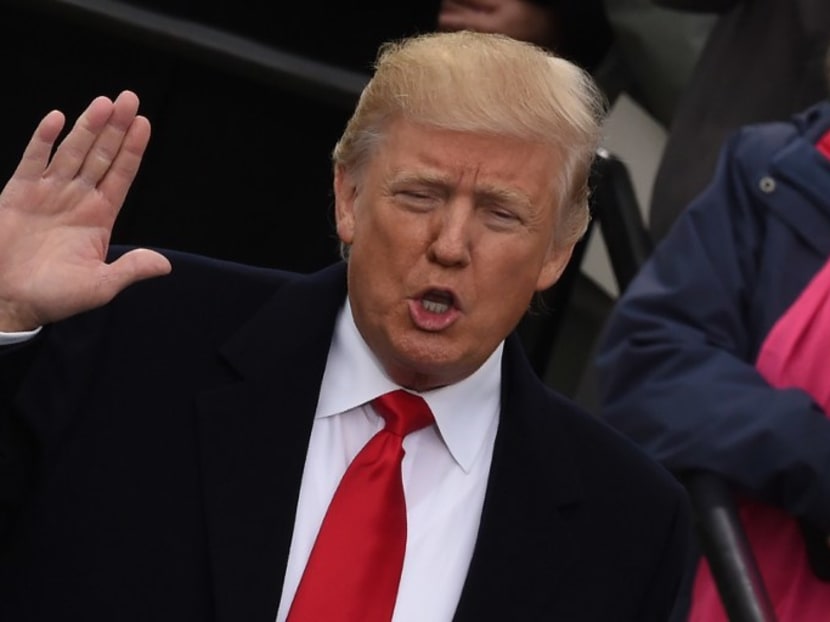China slams Western democracy as flawed
BEIJING — China’s state media used Mr Donald Trump’s inauguration as United States president to warn about the perils of democracy, touting the relative stability of the Communist system as President Xi Jinping heads toward a twice-a-decade reshuffle of senior leadership posts.

Mr Donald Trump being sworn in as the 45th United States president on Jan 20, 2017. The rise of anti-establishment, protectionist politicians like Mr Trump, amid populist winds on several continents, has sent political parties scurrying to shore up their support, helping China to portray itself as relatively steady. Photo: AFP
BEIJING — China’s state media used Mr Donald Trump’s inauguration as United States president to warn about the perils of democracy, touting the relative stability of the Communist system as President Xi Jinping heads toward a twice-a-decade reshuffle of senior leadership posts.
With ministries and senior officials stressing unity as a priority for China, smoothing the path for the party’s congress in the fourth quarter, state media were quick to highlight divisions within America shown by Mr Trump’s elevation, without necessarily directly referencing the new president.
Democracy has reached its limits, and deterioration is the inevitable future of capitalism, according to the People’s Daily, the flagship paper of China’s Communist Party.
It devoted an entire page on Sunday (Jan 22) to critiquing Western democracies and saying that the ultimate defeat of capitalism would enable Communism to emerge victorious.
The unusual series of commentaries in the People’s Daily mirrors Soviet efforts to promote an alternative political and economic system during the Cold War.
The rise of anti-establishment, protectionist politicians like Mr Trump, amid populist winds on several continents, has sent political parties scurrying to shore up their support, helping China to portray itself as relatively steady.
Mr Xi has used recent speeches to international audiences to tout China’s economic and political values and has said that globalisation, despite its flaws, should endure via the existing international system of finance and trade.
That is even as Chinese state media criticises democracy and capitalism amid efforts to build support at home for the party.
"China’s rising wealth has brought greater global presence, but that’s not enough," said Professor Zhang Ming, a political science expert at Renmin University in Beijing. “The Communist leaders want that someday China will matter globally for the nature of its political system and create its own universal values.”
The commentaries came after Mr Trump said in his inauguration speech that his administration would focus on an “America first” approach to foreign policy, undermining hopes abroad that the new president would moderate his protectionist tone. His pledge to abandon a US-led Pacific trade pact has enabled China to step in as the chief advocate of an alternative Asia-wide deal.
"The emergence of capitalism’s social crisis is the most updated evidence to show the superiority of socialism and Marxism," said one of the People’s Daily articles.
"Western-style democracy used to be a recognised power in history to drive social development. But now it has reached its limits," said another article on the same page. "Democracy is already kidnapped by the capitals and has become the weapon for capitalists to chase profits."
During his term, Mr Xi has called for strengthened confidence in China’s communist system. Most recently, China’s top judge called on his cohorts to “absolutely not fall into the trap of false Western ideas”, such as judicial independence, separation of powers and constitutionalism.
Mr Trump’s policies are giving China a chance to take a bigger global role, Prof Zhang noted.
"China doesn’t have a better Communist system than it used to have, but the global economic and political turmoil has undermined public confidence in western democracy," he said.
Still, China faces several difficulties, including questions about its rule of law and own governance among foreign companies operating there.
While it has gained greater military and economic clout in Asia, it is also embroiled in territorial disputes in the East China Sea and South China Sea that have undercut its efforts to build its soft power in the region.
For Mr Xi, there is also the risk of a trade war with the Trump administration and a dispute over China’s currency, Li Daokui, a former adviser to the People’s Bank of China, said at a forum in Beijing in December at Tsinghua University.
"There will be several rounds of battles and China needs to be ready to think about solutions in areas that he may initiate battles," said Dr Li, now a professor at Tsinghua.
"I believe China is ready for the battles. Without going through the wars, it’s impossible for other nations to respect China’s stance, and it’s impossible for China to become a global leader." BLOOMBERG






